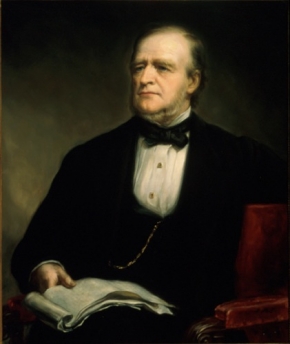You are here
Circuit Court Opinions:
Associate Justice Samuel M. Blatchford, The Head-Money Cases (1883)

The Head-Money Cases, 18 F. 135 (C.C.E.D.N.Y. 1883) [Second Circuit], affirmed, 112 U.S. 580 (1884)
Justice Blatchford heard several cases brought against the collector of customs of the port of New York by shipmasters carrying immigrants to the United States. Under an 1882 statute entitled “An act to regulate immigration,” the shipmasters were required to pay the collector fifty cents for every non-U.S. citizen they landed. They sued to recover the money, challenging the law as unconstitutional.
The plaintiffs first argued that the required payments violated the prohibition on capitation taxes (taxes levied on individuals, also known as head taxes) in Article I, section 9 of the Constitution, which required that “no capitation or direct tax shall be laid, unless in proportion to the census.” Blatchford rejected this argument on the basis that the law was clearly a regulation of commerce and not a capitation tax. Congress had the power to regulate immigration, he noted, and the fifty-cent fee was part of that regulation, constituting payment for a license to bring in foreign passengers.
Blatchford likewise rejected the plaintiffs’ argument that the law was outside the scope of Congress’s taxation power under Article I, section 8. He reiterated that the law’s validity did not rely on the taxing power. As an aside, he disagreed with the plaintiffs that the law was not “uniform” as the Constitution required, because it applied uniformly to all steam and sail vessels arriving at all ports of the United States. The Constitution did not require that a tax apply to everyone, only that it be applied uniformly to the class Congress had chosen to tax. In addition, Blatchford stated that it was outside the province of the court to decide whether the tax was laid for “the general welfare” of the United States, another taxation requirement the plaintiffs believed had not been satisfied.
Lastly, Blatchford was unpersuaded by the plaintiffs’ argument that the law violated treaties between the United States and various foreign nations. He did not believe the law conflicted with the treaties but noted that if there were any conflict the statute would supersede prior treaties. He therefore entered judgment for the defendant in each of the cases. Soon after, the Supreme Court affirmed Blatchford’s decision.
